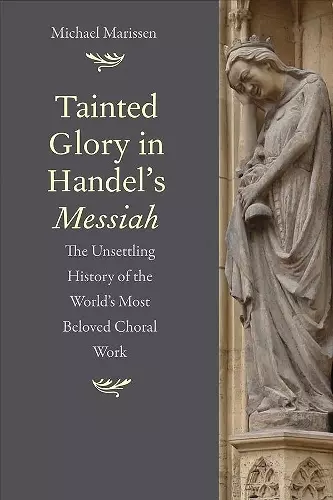Tainted Glory in Handel’s Messiah
The Unsettling History of the World’s Most Beloved Choral Work
Format:Hardback
Publisher:Yale University Press
Published:15th Apr '14
Currently unavailable, and unfortunately no date known when it will be back

An eye-opening reexamination of Handel’s beloved religious oratorio
Every Easter, audiences across the globe thrill to performances of Handel’s “Hallelujah Chorus,” but they would probably be appalled to learn the full extent of the oratorio’s anti-Judaic message. In this pioneering study, respected musicologist Michael Marissen examines Handel’s masterwork and uncovers a disturbing message of anti-Judaism buried within its joyous celebration of the divinity of the Christ.
Discovering previously unidentified historical source materials enabled the author to investigate the circumstances that led to the creation of the Messiah and expose the hateful sentiments masked by magnificent musical artistry—including the famed “Hallelujah Chorus,” which rejoices in the “dashing to pieces” of God’s enemies, among them the “people of Israel.” Marissen’s fascinating, provocative work offers musical scholars and general readers alike an unsettling new appreciation of one of the world’s best-loved and most widely performed works of religious music.
“This is a highly significant piece of work.”—Robin A. Leaver, Fellow of the Royal School of Church Music -- Robin A. Leaver
“When I read Michael Marissen’s essay of a few years back in which he first argued that there was anti-Judaism in some passages of the libretto of Handel’s Messiah, I was not fully persuaded. Tainted Glory in Handel’s Messiah has persuaded me. Marissen shows beyond a doubt that anti-Judaism was in the air in England at the time; so it’s not surprising that there would be anti-Judaism in some passages of Messiah’s libretto. But it is, as Marissen’s subtitle suggests, unsettling. We want Handel’s masterpiece to transcend its cultural context. It turns out that it does not, not entirely. It remains a masterpiece; but those who read Marissen’s book will find themselves listening with somewhat different ears.”—Nicholas Wolterstorff, Noah Porter Professor Emeritus of Philosophical Theology, Yale University -- Nicholas Wolterstorff
“With superb mastery over the sources, both Christian and Jewish, Michael Marissen’s arresting argument indicates that even the most beloved and apparently ecumenical art works might rest on deep religious bigotry. Boldly rebutting his contenders, Marissen’s lucidly articulated humanistic message instructs us that exposing the vexing components of our cherished pantheons would contribute to further understanding of the complexity of culture and the moral responsibility of its inheritors.”—Ruth HaCohen, Artur Rubinstein Professor of Musicology, The Hebrew University of Jerusalem -- Ruth HaCohen
“Not for Messiah haters; but for Messiah lovers who want to know what they’re singing every year, warts and all.”—David Van Biema, author of the forthcoming Speaking to God: A Cultural History of the Psalms -- David Van Biema
“This work . . . shows painstakingly cited original research.”—Library Journal * Library Journal *
ISBN: 9780300194586
Dimensions: 210mm x 140mm x 17mm
Weight: 445g
232 pages